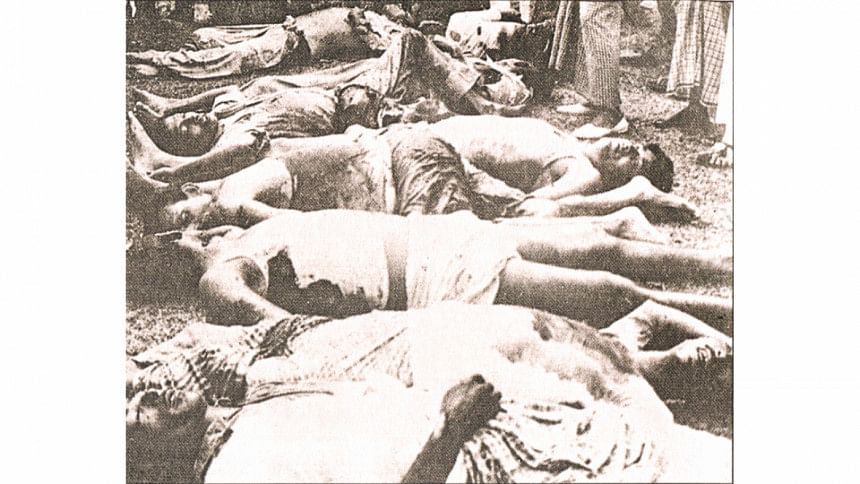The night of horror

A heavy rain on the night of March 29, 1971 uncovered parts of two mass graves on the Dhaka University campus, according to a US diplomatic cable sent from the erstwhile East Pakistan.
Archer Kent Blood, then US consul general in Dhaka, had sent the cable next day to the US State Department on "Killing At University".
"… Exposed Some Bodies, Stench Terrible," Blood said about the graves.
One of the graves was near Rokeya Hall, a female students' dormitory, and the other near Iqbal Hall, the cable mentioned.
The cable was typed after an "American serving with FAO" visited Blood to report on his tour of Dhaka University on March 27, a day after the Pakistan army had launched its genocidal crackdown on Bangalees in the wee hours of March 26.
"Major Atrocity Recounted To Him [the unnamed American] Took Place At Kokeya [Rokeya] Girls' Hall, Where Building Set Ablaze And Girls Machine-Gunned As They Fled Building," read the telegram.
"Girls Had No Weapons. Forty Killed," it continued.
The American man's tour of the university was hosted by some of his contacts at the university who were not named, explained the cable, adding he recalled to have seen "Tightly Packed Pile Of Approximately Twenty Five Corpses (Male)" which constituted the "Last Batch Of Bodies Remaining, Others Having Been Disposed Of By Army" at Iqbal Hall.
An empty army truck "Arrived To Remove Bodies", mentioned the cable.
"Students Either Shot Down In Rooms Or Mowed Down When They Came Out Of Building In Groups," Blood said, quoting the American man who was briefed by witnesses during his visit.
He was told that "Weapons Students Had" at the male dormitory and "Girl Student Activists" residing at the female dormitory "Infuriated" the army.
"Estimated 1000 Persons, Mostly Students, But Including Faculty Members Resident In Dorms, Killed," read the cable that also mentioned one faculty member was shot inside his residence.
Citing closure of the university an obstruction to get a concrete estimate, the telegram stated, "… Many If Not Most Students Gone Undoubtedly Reduced Casualties."
And "… All University Files Burned By Army In What Appeared To Be Purposeful Move."
With the subject line "Extent of Casualties in Dhaka" on March 31, 1971, Blood, in another telegram, informed the State Department, "… We Would Estimate That Perhaps As Many As 4,000 to 6,000 People Thus Far Have Lost Their Lives As A Result Of Military Action."
There were students, university faculties and East Pakistan Police men killed "During The Really Hard Fighting On Night Of The 25th."
Another telegram written on the same day started, "Disturbing Aspect Of Current Situation Is That Wanton Acts Of Violence By Military Are Continuing In Dacca."
Referring to the account of a "Bengali Businessman Not AL [Awami League] Supporter", the cable wrote the man had seen "Six Naked Female Bodies At Rokeya Hall, Dacca U. Feet Tight Together. Bits Of Rope Hanging From Ceiling Fans. Apparently Raped, Shot, And Hung By Heels From Fans."
The men forced to dig out one of the mass graves reported having buried 140 bodies, while "Other Grave Equally Large."
The Japanese had reports of 400 people being killed in that military offensive, mentioned the cable.
"Servants And University Maintenance Staff Shot Down," it continued.
Reporting on "EPR (East Pakistan Rifles) Camp At Peelkhana", the telegram reported, "Truckloads of Prisoners Seen going Into EPR Camp … Steady Firing Heard In Area Yesterday And Today."
"ConGen Officer Heard Steady Firing Of Approximately 1 Shot Per Ten Seconds For 30 Minutes," it said.
In addition to the three cables discussed, Blood earlier had sent two more telegrams. The first one sent on March 26 reported "A Reign Of Terror By The Pak Military", confirming deaths of five Dhaka University teachers.
In the second one dated March 29, he reported "Selective Genocide" by Pakistan Military, calling on his government to take action "Prior To Inevitable And Imminent Emergence Of Horrible Truths …"
As his government did not respond and the "massacre" stirred the conscience of US employees at the Consulate, AID [USAID] and United States Information Service, 20 of them signed a "Dissent From U.S. Policy Toward East Pakistan" on April 4, 1971.
"Most Likely Eventual Outcome Of The Struggle Underway In East Pakistan Is A Bengali Victory And The Consequent Establishment Of An Independent Bangla Desh," Blood wrote.
This year US Ambassador to Bangladesh Marcia Bernicat gave The Liberation War Museum the historic telegrams, stamped with the seal of the US as official acknowledgement of the US diplomat's correspondences.
And the book "The Blood Telegram" written by Gary J Bass on the telegrams has won the world's two most prestigious non-fiction and history awards last year.

 For all latest news, follow The Daily Star's Google News channel.
For all latest news, follow The Daily Star's Google News channel. 



Comments